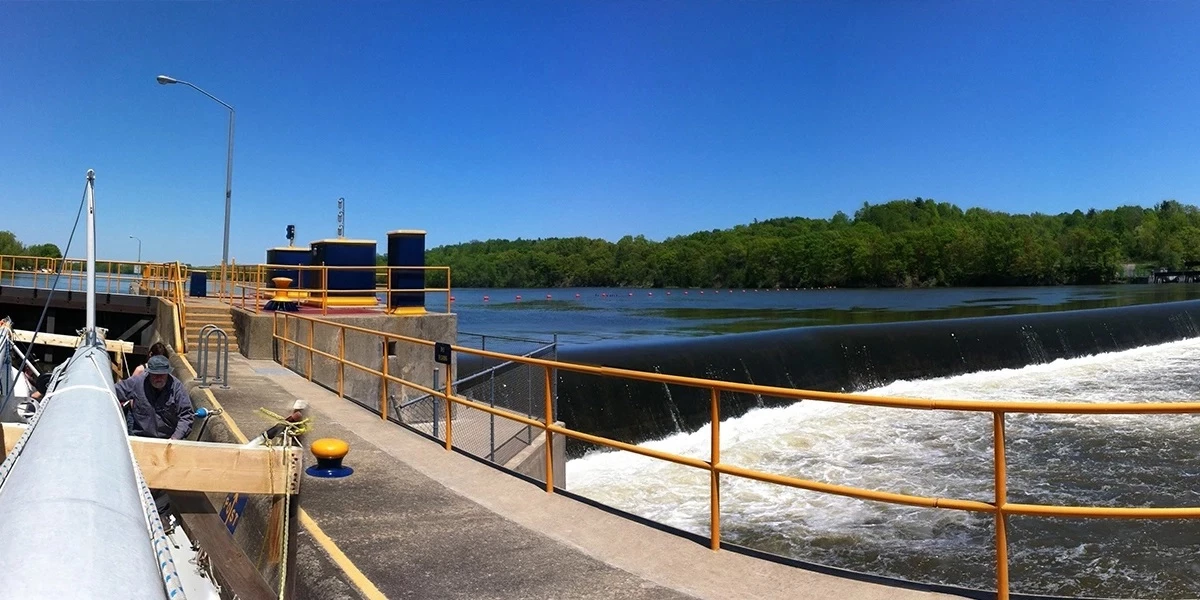

Rubber dams are a flexible and effective solution for water management, with significant advancements in recent years. These innovative structures address various water-related challenges, making them popular among municipalities, agriculture, and recreational areas. A key advantage of rubber dams is their flood mitigation capability. Controlling water levels in rivers and streams helps prevent overflow during heavy rainfall or snowmelt, protecting communities and infrastructure, especially in areas prone to extreme weather.
Additionally, rubber dams support irrigation by creating temporary reservoirs that store water during dry periods, ensuring agricultural lands receive the necessary moisture. This mainly benefits arid regions, enhancing productivity and contributing to food security. A rubber dam in India also facilitates hydropower production, harnessing flowing water to generate electricity. Their flexibility allows for optimised water flow management, aligning energy production with demand and environmental conditions. Furthermore, rubber dams create calm water bodies suitable for recreational activities like fishing.
Here are the key notable advancements in rubber dam technology that have happened on an evolutionary basis.
Developing high-performance materials, such as high-strength rubber compounds and advanced textile fabrics, has significantly improved the durability and longevity of rubber dams. These materials can withstand extreme weather conditions, including high water pressure, freezing temperatures, and UV radiation. Additionally, sophisticated design techniques and computer-aided engineering (CAE) tools have enabled the development of more efficient and customised rubber dam construction solutions, leading to improved hydraulic performance, reduced maintenance requirements, and increased operational flexibility.
The integration of automated control systems has streamlined the operation of rubber dams, allowing for remote monitoring and control. This has increased efficiency, reduced labour costs, and enhanced safety.
Using environmentally friendly materials and sustainable manufacturing processes has become a priority in the rubber dam industry. This ensures that rubber dams have minimal environmental impact.
Rubber dams have a wide range of applications, including:
Rubber dams can help protect communities from floods and mitigate their impact by raising or lowering the water level.
Rubber dams can be used to divert water for irrigation purposes, ensuring a reliable water supply for agriculture.
Rubber dams generate electricity by creating a head of water, contributing to renewable energy generation.
Rubber dams can be designed to facilitate the migration of fish, minimizing the impact on aquatic ecosystems.
Rubber dams can create recreational areas for boating, fishing, and swimming.
Choosing YOOIL Envirotech means you are investing in high-quality, reliable, and environmentally friendly rubber dam solutions that are designed to meet the needs of today while being mindful of tomorrow. Our commitment to excellence ensures that you receive products that not only perform exceptionally but also contribute positively to the environment. As we witness rapid advancements in rubber dam technology, YOOIL Envirotech is at the forefront of these innovations, ready to unveil even more cutting-edge and sustainable options.
Our research and development teams are dedicated to exploring new materials, designs, and applications that enhance the efficiency and effectiveness of our rubber dams. This proactive approach allows us to stay ahead of industry trends and continuously improve our offerings. YOOIL Envirotech is a global leader in designing, manufacturing, and installing rubber dams. With a strong commitment to innovation and sustainability, YOOIL Envirotech, the prominent rubber dam company in India, offers a wide range of rubber dam solutions to meet the diverse needs of its customers. Key advantages of YOOIL Envirotech's rubber dams:
YOOIL Envirotech uses high-quality materials and advanced manufacturing techniques to produce durable and reliable rubber dams.
The company works closely with clients to develop tailored solutions that meet their requirements.
YOOIL Envirotech is committed to minimising the environmental impact of its products and processes.
The company provides comprehensive technical support and after-sales service to ensure customer satisfaction.
With a strong global presence, YOOIL Envirotech can offer support and services to clients worldwide.
Some specific examples of YOOIL Envirotech's rubber dam solutions include:
These dams are designed to withstand high water pressures and are ideal for hydropower generation and flood control.
These dams are suitable for irrigation and recreational purposes, balancing functionality and aesthetics.
These dams incorporate features that allow fish to migrate upstream and downstream, minimising their impact on aquatic ecosystems.
By embracing these technological advancements, we can harness the power of water in transformative ways. Our solutions are not just about managing water resources; they are about addressing some of our planet's most pressing challenges today. Water scarcity, a growing concern in many regions, can be mitigated by using our rubber dams, which help in the efficient storage and distribution of water. Furthermore, our innovative solutions play a crucial role in enhancing food security. By ensuring a reliable water supply for irrigation and agricultural practices, we empower communities to produce more food sustainably, reducing hunger and improving livelihoods.
In the context of climate change, our eco-friendly rubber dam solutions contribute to resilience and adaptation strategies. By shaping water flow and reducing the risk of flooding, we help protect ecosystems and communities from the adverse effects of climate variability. In summary, opting for YOOIL Envirotech provides you with superior rubber dam solutions and aligns you with a vision for a sustainable future. Together, we can leverage the potential of water to create lasting positive impacts on global challenges, ensuring a better world for generations to come.
